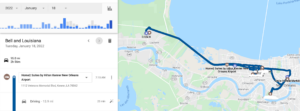I must admit it has been a while since I have posted. No other excuses other then it has been a busy few months. Got back from my last trip to New Orleans, then had a Kentucky trip (that got canceled), a Minneapolis trip that got canceled while I was enroute. Then some Jacksonville, FL, and then down to Miami, then Minneapolis again (this time the inspection finished), then a canceled flight in Dallas, home to Florida, a day of inspections in Florida, and now up to Charlotte, NC. Wow…….
In addition to all this Jesse and I have both been working on testing for our amateur radio licenses and getting our stations set up. Why? For a few reasons. First, I have been wanting to do this since I was a young teenager, I had started to study for my ham (amateur licenses) and life eventually got in the way. Now I have the time, and the money, and the electrical background to make it happen. The second reason is a little more complicated. The world has become a crazy place and we are much too reliant on the internet and all the digital communications that go along with it. It is far too easy for the internet as we know it today to be taken off the “air” and if that grid goes down, communication is going to be a problem. Amateur radio’s primary purpose has always been to communicate via a non-commercial means, and to aid others communicate in case of a disaster.
Think about all the digital, radio connected devices you use daily. What is their communication range? What happens to the “network” if the power goes out, if the internet drops, if the generators for the cell tower’s (those that have them) fail to start? What happens to your broadband to your homes and business if the power fails? How many people still have a copper, four wire land line? Almost now one. We rely on the digital communications based on the concept that the internet works. Our cell towers, broadband distribution systems, and all of your technology is based on the premise that the internet works, and connectivity stays. Let’s ask the people of Ukraine how well that premise is working right now.
I took my FCC Technician Class exam in February and passed (got one question wrong). I received my call sign KO4YAW, I studied for another few weeks and took my FCC General Class exam and passed. This gave me access to most of the Amateur radio bands. I am studying for the top and final level of the licensing, the Amateur Extra Class license. Having done the first two levels of licensing it was time to start setting up my base station and portable stations.
Jesse and I decided that we wanted to have access to all the bands. So, we put up one UHF/VHF antenna with a 50-Watt transceiver in Jesse’s office. This allows us to access all the repeaters (a repeater takes a local low-powered signal and propagates it to a greater area). Repeaters are not tied to the internet; they communicate with other repeater sites via microwave communications. In Polk County, Florida we are extremely lucky to have access to a Polk County repeater network. Covers the entire county and we can hit two repeater sites from our house. We also have access to a statewide network of repeaters maintained by the Florida Department of Transportation called SARNET. SARNET allows us to communicate state-wide from anywhere within Florida on the VHF/UHF bands. We are also very fortunate to have access to the Lake Wales Repeater Association (local amateur radio club) repeaters. Then we can also hit the Lakeland club repeaters that give us access to a national network. That takes care of our communication on a statewide and national level.
For several reasons, we also decided to put together an HF station. The HF frequencies allow national and international communication. We added a 30-foot antenna for the HF (high frequency) bands. So far, I have already communicated with Norway, Brazil, Nova Scotia, Washington State, California, Texas, North Carolina, New York, Connecticut, and a few people in various places in Florida. Not only is this fun, but it guarantees us communication in case someone decides to take the network down. Be it storm, hacking, war, etc. the radios will always work.
Jesse will be taking his Technician Class exam in a few weeks and once he has that I know I will be able to reach him and communicate with him regardless of what happens to our digital networks, because FM will always be FM, and AM will always be AM. The analog world still exists, and hopefully will always exist.
The technician class exam is accessible to all, and is free (or a very minimum charge as in $10-$15). An amateur radio costs under $200.00 in some cases, and there are repeaters all over the country. Give it a try, maybe we will see you on the air.
So, that is what I have been up to for the last month or so that I have not been posting. Between travel, studying, and putting together a ham radio station, I think I have an excuse not to post.
See you soon!
-Chris
KO4YAW
